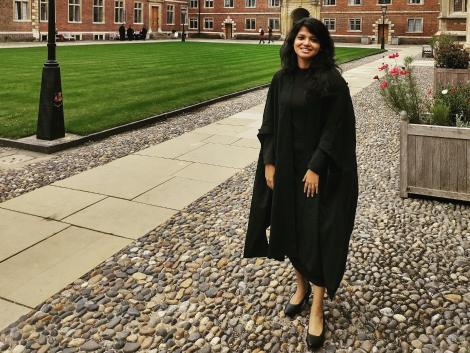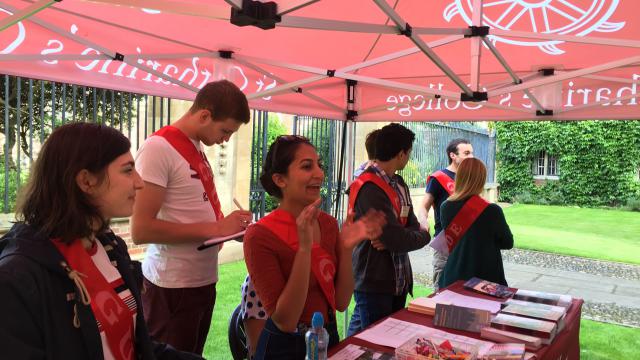Name: Sampurna Mitra
Hometown: Kolkata, India
Extracurricular interests: Singing Indian music, playing badminton, reading (especially detective thrillers)
Postgraduate degree: PhD in Chemistry
Life before Catz
“My undergraduate degree at Lady Brabourne College, under the University of Calcutta, was disrupted by the COVID-19 pandemic: I ended up completing the first half of the course in person and the second half from home. My Master’s degree was at the Institute of Chemical Technology in Mumbai but equally important were the internships that I got to experience, which enriched my understanding of my subject and inspired me to pursue a PhD. My first internship was focused on the application of thermal catalysis in the energy sector, which was a fascinating introduction to how hydrogen can be produced thermochemically. The next internship gave me more exposure to both electro- and photocatalysis, which will be critical for producing hydrogen more efficiently and sustainably. The teams who I met during my internships were following the research of Professor Erwin Reisner, the Professor of Energy and Sustainability in the Department of Chemistry at the University of Cambridge. This convinced me that the best place to continue my education would be in his lab so I approached him before applying to Cambridge.”
Life at Catz
“I had no idea about how the collegiate system worked when I applied so I submitted an open application rather than pick a college. When I heard that Catz was offering me a place, I checked with Professor Reisner who reassured me that it was a very good college. He was right and I’ve ended up loving being part of the Catz community. I am happy that Catz is not as intimidating as some of the other colleges – I would even call it cosy! The Middle Combination Room (MCR) Committee organises so many activities for postgraduates, which have helped me meet new people and build some great friendships. Another reason for this cosiness is probably sheer luck: I was allocated a room in a Catz-owned house with two other Harding scholars, so I’m living with people in similar situations to me.”
Postgraduate studies
“One of the crucial problems that the world is facing today is the need for a clean, renewable energy resource. During my past research works I have had the opportunity to contribute a very small amount in addressing this problem. In my doctoral research I want to explore more in this field of electrochemical catalysis and deal with the problems of green energy storage and utilisation. I want to work towards the carbon neutral goal.
“In particular, I will develop molecular hybrid photoelectrodes for solar chemistry device construction. In order to produce fuel, I will synthesize molecular, 3D transition metal complexes and anchor them to semiconductor electrode surfaces. Solid-state techniques will be used to characterise the hybrid materials, while electrochemical techniques will be used to evaluate their performance. The photoelectrodes will then be connected to a photoanode that can oxidise waste streams or water. Finally, a working solar-powered device will be assembled to show how waste may be converted into fuel and chemicals.”
The Harding Distinguished Postgraduate Scholars Programme
“I knew from the start that I would require a fully-funded scholarship to pursue my dream of a PhD. The Harding programme is the best level of funding that I could ever have hoped for. The additional research allowance has enabled me to buy a better laptop and attend a two-day conference (UK Solar Chemicals Network Symposium) in Liverpool. I want to give something back so I have volunteered to join the programme’s Scholars Committee.”
Advice for undergraduates thinking of applying for postgraduate studies
“Being worried during interviews is very common but you can’t let the uncertainty affect your answers so try to clear your mind and focus on the questions. Remember that nobody knows your research interests better than you but at the same time honesty is also important – you might not know about all research questions that you are asked and that’s okay because you are being interviewed by experts and they will respect you for not sugar-coating your answers.
“As an international student, I was perhaps most anxious about my English language skills. In reality, you just need to be good enough to communicate your ability and passion, and expressing yourself simply is a strength not a barrier. If anything, showing you can think outside the box is perhaps more important than your choice of words.”






